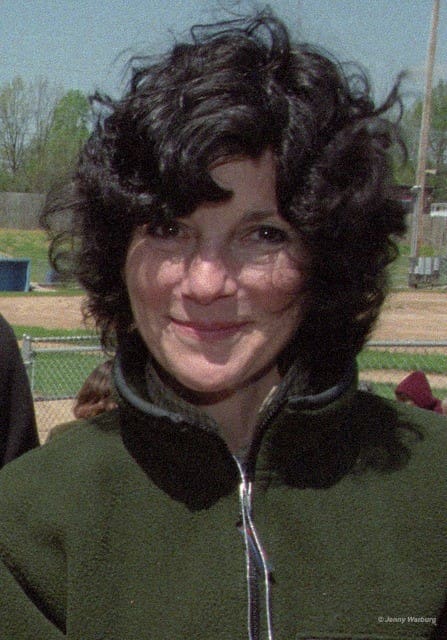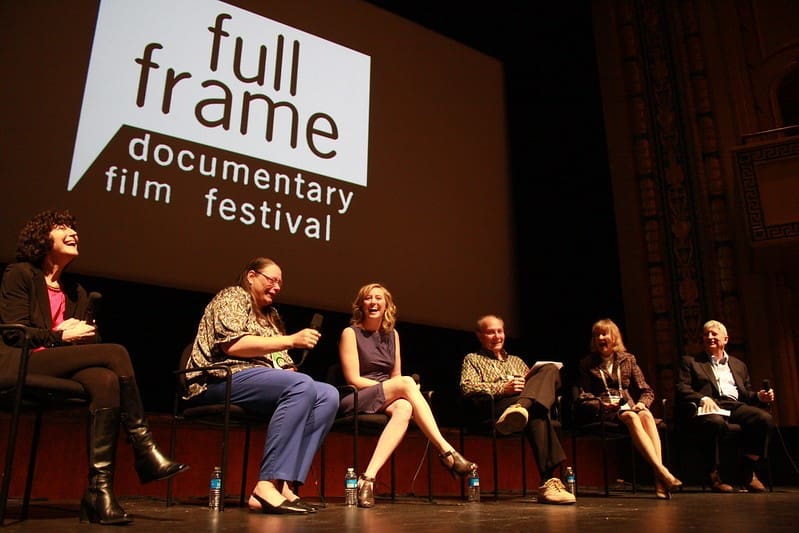
On Wednesday, August 30, Full Frame Documentary Film Festival founder and Emmy and Peabody Award-winning documentary filmmaker Nancy Buirski passed away. As friends and colleagues around the world mourned her loss, Tom Rankin wrote the following tribute to Buirski, remembering, in particular, her immense impact at Duke and in Durham.

Accepting Nancy Buirski’s death has been difficult for so many of us who witnessed her fearless magic for all these years, who have had a front seat in the theater of her many accomplishments as a festival Director, teacher, and filmmaker. I arrived at Duke as Director of the Center for Documentary Studies in 1998, the year of Nancy’s inaugural DoubleTake Documentary Film Festival at CDS. By today’s yardstick it was small, a certain start-up. But the seeds were already well germinating and as with so many brilliant innovations, we can look back and see how integral Nancy’s founding ideas were to the current moment of documentary at Duke, in Durham and beyond.
This past week I re-read Nancy’s original 1996 proposal for a documentary film festival to be housed at the Center for Documentary Studies. She was moving to Durham, had achieved much as a published still photographer and as a picture editor at the New York Times, and saw in the Center an opportunity to broaden its imprint more deeply into documentary film. “Just as the Center embraces documentary expression in many forms,” she wrote in her two-page prospectus, “so, too, should this festival, broadening the definition of documentary film and thereby broadening its audience.” Her idea anticipated the explosion in all kinds of documentary production with digital video offering new points of entry, in new voices and stories, in the myriad ways that approaches to documentary narrative were evolving and diversifying. Nancy’s proposal, wisely, was to take the name of the young, but already critically acclaimed DoubleTake magazine for the festival – offering ways to expand audiences in multiple directions (in 2002 the name of the festival changed to Full Frame). Perhaps all this sounds obvious looking back, like anyone could have done something similar. Great ideas often appear inevitable upon reflection. However, as with all successful founders, Nancy acted on her ideas with a level of energy and commitment that few could keep pace with, making something beautiful, necessary, and lasting where nothing had been before.
What this idea of a film festival at CDS, Duke and in the Triangle ultimately brought us was an energy and a model of thinking that continues to influence documentary today. Nancy’s festival ideas joined a rich community of scholars, makers and viewers who were already active on so many fronts, but also ready for more. The diverse converging tributaries that ultimately merge to create the richness in cinematic and documentary arts at Duke have certainly been a key to all the success. That said, there is no way to overestimate the catalytic contributions of Nancy’s work as the founding Director of Full Frame in fostering the documentary ecosystem in which we now live and work. Full Frame continues to serve as the central programmatic tent pole for so many constituencies in the documentary arts, with connecting tenacles reaching far to embrace and engage with an international community of documentary makers.
Nancy built a festival where filmmakers have always been a central focus and they attended in large numbers, a real gift to audiences. When Nancy, Professor David Paletz, and I started a new class for Duke undergraduates around Full Frame, we included at least 4 visits from filmmakers, all of whom had connections to Full Frame. “Contemporary Documentary Film, Filmmakers, and the Full Frame Film Festival” (too long a course title, but necessary) was a spring class of 70-100 students who met for 4½ hours once per week in the Nasher Museum auditorium. They also attended the festival as part of the requirements. The class was designed to focus as much thought and consideration on the filmmaker/filmmaking vision and process as the films. We alternated lectures between the three of us, and Nancy’s stellar teaching, including discussions with visiting filmmakers and the role of the film festival in contemporary film, was integral to the course. Thinking back, Nancy may have learned the most of anyone in those sessions, evidenced most notably by the six award-winning documentary films she made the subsequent years after she ceased teaching and directing the festival.
Nancy’s distinctive creativity can be seen in so much of her work. Early in the life of the festival, she programmed fiction films that employed documentary strategies and content, and documentary films that were slowly beginning to employ the art of fictional storytelling. Today that may seem an obvious choice of emphasis, but she was pointing the way before others recognized the trail. Her endless aspiration coupled with a laudable, determined work ethic served as a model for so many around her. She was fearless in pursuit of her goals. The obstacles and rejections never seemed to alter her quests, instead, she just seemed to re-fuel for another day, call a different office, revise the proposal for resubmission, or knock on a different door.
Talking to so many people in the last week about Nancy’s legacy, I’ve heard acknowledgment of how rare it is for someone to move from starting and running something like Full Frame to then making their own films. She had an ear and eye for the important stories, the histories that needed to be told in film. A review of her six documentary films bears witness to that. Her first film, “The Loving Story” (2011), won an Emmy for outstanding historical programming and a Peabody Award. “The Rape of Recy Taylor” (2017) was awarded a human rights prize at the Venice International Film Festival. The list of awards and screenings goes on and on. In an interview with Stephanie A. Taylor after the release of “The Rape of Recy Taylor,” Nancy responded to questions about success and her advice to other women filmmakers. “It’s usually about the story,” she said of making a powerful film. “Success almost has to do with the power of the story. And then of course you hope you tell it well. You put it on the screen so people will feel its resonance. I would just say just make your film and don’t let anybody tell you no. Look at the best work out there. Look at the films that help you solve your problems, be inspired by them. Don’t be intimidated by them. Keep the bar very high because if you look at the best stuff that’s what you’ll want to do. It doesn’t matter if you’re female. I would almost say don’t think of yourself as a female filmmaker. If you want to be an activist and help other filmmakers, that’s great. But in terms of making your movie, just make your movie.”
Nancy Buirski created so much—a festival with offspring in every direction and a catalogue of her own films that are the envy of any working artist. Nancy’s fearless force of nature never allowed me to imagine she’d be leaving. Her voice was so often in the room in conversations about where we should go next and how we get there. Her relevant and unceasing vision endures, an inspiring and guiding light for all of us in the community of documentary.
Director, MFA in Experimental and Documentary Arts
Professor of the Practice of Art and Documentary
Art, Art History, and Visual Studies

Tom Rankin is Professor of the Practice of Art and Documentary Studies at Duke University where he directs the MFA in Experimental and Documentary Arts. For 15 years he was director of the Center for Documentary Studies at Duke. Learn more.
Duke Students & Employees save more!